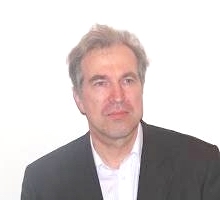Yuri Matiyasevich a étudié à Léningrad à l’école N°239 (en), spécialisée en mathématiques et physique (où ont aussi étudié, par exemple, Grigori Perelman ou Stanislav Smirnov). En 1964, il remporte une médaille d’or pour l’URSS aux olympiades internationales de mathématiques, qui se déroulent à Moscou.
En 1969, à l’issue d’une formation au département de mathématiques et de mécanique, il obtient un diplôme de l’université d’État de Léningrad. Il poursuit des études doctorales au sein de l’institut de mathématiques Steklov à Saint-Pétersbourg (LOMI1).
S’appuyant largement sur les travaux de Julia Robinson, il prouve en 1970, l’indécidabilité au dixième problème de Hilbert, source principale de sa renommée internationale. À cette époque, il découvre aussi l’algorithme de Knuth-Morris-Pratt avant ceux-ci.
En 1996, le titre de docteur honoris causa lui est décerné par l’université d’Auvergne.
En 1997, il est élu membre correspondant de l’Académie des sciences russe.
En 2003, le titre de docteur honoris causa lui est décerné par l’université Pierre-et-Marie-Curie (Paris 6).
Il est actuellement le Conseiller RAS* auprès du laboratoire de logique mathématique au PDMI, à Saint-Pétersbourg.
Yuri Matiyasevich studied in Leningrad at school No. 239 (en), specializing in mathematics and physics (where also studied, for example, Grigory Perelman or Stanislav Smirnov). In 1964, he won a gold medal for the USSR at the International Mathematical Olympics, which take place in Moscow.
In 1969, after training at the Department of Mathematics and Mechanics, he graduated from Leningrad State University. He is pursuing doctoral studies at the Steklov Institute of Mathematics in Saint Petersburg (LOMI1).
In 1997, he was elected a corresponding member of the Russian Academy of Sciences.
In 2003, the title of doctor honoris causa was awarded to him by the Pierre-et-Marie-Curie University (Paris 6).
He is currently the RAS * Advisor at the Mathematical Logic Laboratory at PDMI, St. Petersburg.
* RAS : Russian Academy of Sciences

